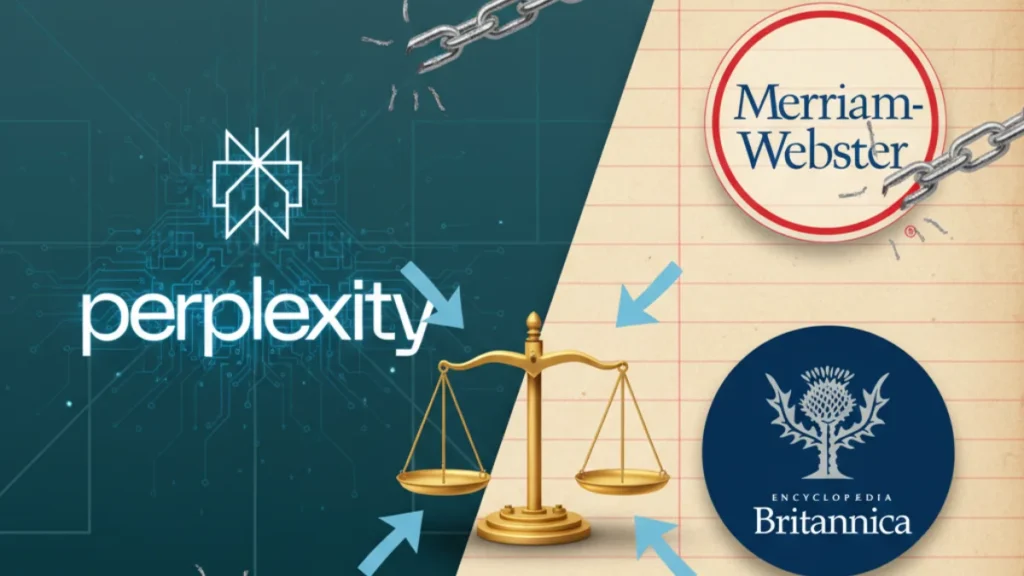Perplexity AI just got hit with a heavyweight lawsuit.
Britannica and Merriam-Webster accuse the San Francisco search startup of siphoning traffic, reproducing their content without permission, and even misattributing errors to their brands. The case could redefine how AI tools interact with publishers’ intellectual property.
Key Takeaways
- Britannica and Webster sue Perplexity for copyright and trademark misuse.
- Lawsuit alleges Perplexity “cannibalizes” web traffic and revenue streams.
- AI hallucinations wrongly attributed to brands cited as trademark violations.
- Case adds to mounting legal fights against generative AI companies.
- Outcome could shape publisher–AI revenue-sharing models worldwide.
Britannica and Merriam-Webster have filed a lawsuit against Perplexity AI, accusing the startup of copyright infringement, trademark misuse, and diverting web traffic. The suit argues Perplexity reproduces their content in AI responses without attribution, harming subscriptions and ad revenue. This case underscores rising tensions between publishers and generative AI platforms.
Britannica and Webster Take Aim at Perplexity
Two of the world’s most trusted knowledge institutions — Encyclopedia Britannica and Merriam-Webster — are suing Perplexity AI, a San Francisco-based search startup. Filed in New York federal court this week, the lawsuit claims Perplexity’s conversational search tool infringes copyrights, violates trademarks, and undermines the publishers’ business models (Reuters)
The plaintiffs argue that Perplexity’s tool “free rides” on their intellectual property by pulling in their definitions, explanations, and reference entries, then presenting them directly to users. By doing so, they say, it eliminates the incentive for readers to visit their websites, where traffic fuels subscriptions and advertising revenue.
Accusations of Cannibalized Traffic
According to the filing, Perplexity’s practice amounts to “cannibalizing traffic” — depriving Britannica and Webster of both visibility and income. The publishers allege the AI reproduces their content without consent, essentially reaping the benefits of decades of editorial investment without compensation.
Beyond copyright concerns, the suit raises a trademark angle: Perplexity’s answers sometimes contain errors — AI “hallucinations” — but the system still tags them as Britannica or Webster content. The plaintiffs argue this misrepresentation tarnishes their reputations.
A Pattern of AI Lawsuits
This isn’t Perplexity’s first legal battle. News Corp sued the company in 2024, alleging it republished articles from the Wall Street Journal and New York Post without permission. That case is ongoing.
The new lawsuit aligns Perplexity with other AI firms under fire, including OpenAI and Google, both of which face lawsuits from publishers and authors over unauthorized data use in training or deployment.
Why Publishers Are Pushing Back
Publishers see AI search as both opportunity and threat. On one hand, these tools help audiences get quick, clear answers. On the other, they erode the incentive to click through to source material.
“Traffic is our lifeline,” one digital publishing analyst noted. “If chatbots deliver all the answers, publishers lose the revenue that funds quality journalism and reference works.”
To counter these risks, some AI companies have begun striking licensing and revenue-sharing deals. Perplexity itself launched a program in August 2025 that promises to pay publishers when its system uses their content. Whether Britannica and Webster considered joining remains unclear.
Global Implications of the Case
This lawsuit goes beyond one company. If Britannica and Webster succeed, courts could set new precedent: AI tools may need explicit licenses before displaying content, even if pulled in real time from the open web.
That could reshape the economics of generative AI worldwide. Instead of “scraping first, settling later,” AI firms may need to negotiate formal partnerships up front.
What Happens Next
Britannica and Webster are seeking monetary damages, though the amount hasn’t been disclosed. Perplexity has not yet issued a public response.
Legal experts expect a protracted battle. AI-related copyright cases are notoriously complex, and judges have yet to deliver a unified standard. Still, this case will be closely watched, especially by publishers struggling to maintain digital revenues in an AI-first internet.
Conclusion
Britannica and Webster’s lawsuit against Perplexity crystallizes the tension between AI innovation and publisher survival. The case could push the industry toward clearer revenue-sharing models — or mark a turning point in how courts regulate AI’s use of protected content.
